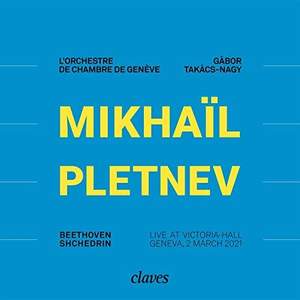It should have been just another memorable concert in the hectic life of the Geneva Chamber Orchestra. However, the global Covid-19 pandemic decided otherwise and turned this summit meeting with conductor Gábor Takács-Nagy and pianist Mikhaïl Pletnev into a historical moment. Chronicle of an extraordinary adventure...in every respect.
Tuesday, 2 March 2021 was a date written in the orchestra’s calendar, just like the dates of the season’s many other concerts. The difference is that since March 2020 and the first general lockdown of the music planet (along with a good part of all other activities), it has become customary to look ahead with extreme wariness in the daily expectation of having to respond to some new slowdown measure. While concerts timidly resumed at the beginning of the previous autumn, the hammer that everybody had been dreading fell on 3 November at 3pm: the Geneva State Council decided that everything should close again ! Everything? The question arose immediately, and we already started thinking about saving what could still be saved. If rehearsals with professional ensembles following a strict sanitary protocol were still allowed behind closed doors, could a concert performed without an audience be assimilated to a rehearsal, legally speaking? The orchestra’s management breathed a sigh of relief when learning that this was the case...so the world hadn’t completely stopped turning ! The 20-21 season continued according to plan in the same splendid Victoria Hall but in front of empty chairs...and cameras. A dazzling golden age of video streaming had begun. “A strange experience for the musicians,” according to Frédéric Steinbrüchel, the orchestra’s General Manager. “You give all you can, and nobody is there to receive it”.
Weeks and months went by: the winter was critical in terms of health. Although a first timid allowance of 50 spectators per performance was announced for spring 2021, the date of 2 March still seemed as it would be without an audience. Since the orchestra had no intention of missing out on such a bill, it did its best to find another way of promoting the event. The Claves record label was approached and was won over by the idea of making a live recording of the concert. For Frédéric Steinbrüchel, who is always keen to accompany the audience in its musical experience, the challenge did not stop there: “To offer the audience something emotional and lively, and also to keep a trace of these extraordinary circumstances, I contacted the Spanish documentalist Alexis Delgado, who agreed at very short notice to come to Geneva with his team. Such an emergency situation enables things that would normally not be possible or more difficult to organise. When he arrived, the film producer explained that his work would be greatly facilitated if he could relate it to some “dramatic” underlying theme. He couldn’t have put it better: the morning of the concert, just as the filmed dress rehearsal was about to start, the sky fell down on the orchestra’s management team.





